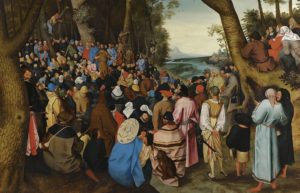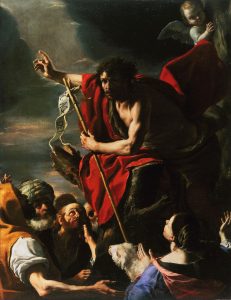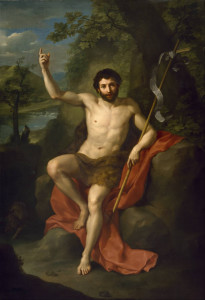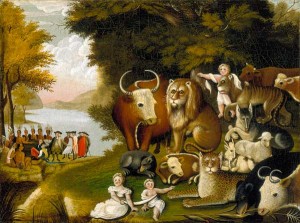Illuminations on the Lectionary readings for Dec. 7, 2025 (Advent 2A)

Saint John the Baptist Preaching to the Masses in the Wilderness (unknown date); oil painting on oak by Pieter Breughel the Younger (1564-1638). Galerie de Jonckheere, Paris. (Click image to enlarge.)
First Reading: Isaiah 11:1-10
Repent! In our readings for the Second Sunday of Advent, we hear a bold call to repent and wait for the Messiah’s coming. Don’t think of repentance in its modern idea of deep regret and remorse, though. Hear it rather in its ancient sense, signifying “change your mind” in New Testament Greek, or “turn back” in the Hebrew Bible. If we are on the wrong path in our relationships with God and our neighbors, now is the time to turn back and watch for the light of God’s Kingdom. In our first reading, the prophet Isaiah envisions a time when the Messiah – the descendant of King David, whose father was named Jesse – will reign from Zion’s holy mountain. The lion and the lamb will lie down together, peace will reign, and the poor will receive justice.
Psalm: Psalm 72:1-7, 18-19
Psalm 72, titled “Prayer for Guidance and Support for the King” in the New Revised Standard Edition, may have been originally composed to be sung at a royal coronation. It offers both support and counterpoint to the Isaiah reading. It reiterates the Hebrew Bible’s consistent call for justice and righteousness for all the people, including the poor, the needy, and the oppressed. Jesus surely knew these verses and proclaimed them in his commands to love our neighbors, shun riches, and bring good news to the poor.
Second Reading: Romans 15:4-13
Paul wrote this letter at a time when all of Rome’s Jews, who had been banished to exile for a decade by the Emperor Claudius, were finally able to come back home after the emperor died. But there was new tension in this Roman congregation as returning Jewish Christians rejoined Christian communities that had become entirely Gentile. Paul turns to the Isaiah passage that we heard in the first reading as he calls attention to the Root of Jesse: Isaiah’s prophecy of the Messiah coming as king over all.
Gospel: Matthew 3:1-12
Now we encounter John, the cousin of Jesus. John has become – as his father, the temple priest Zechariah, foresaw in the canticle that we sang two weeks ago – a great prophet in the spirit of Isaiah and Jeremiah. This is a loud, angry, and startling prophet indeed, dressed in camel’s hair and eating locusts and honey. He insults the Pharisees and Sadducees as “a brood of vipers” as he calls on the people to be baptized in the Jordan River as a sign of repentance from sin. John declares himself the prophet who Isaiah said would cry out in the wilderness to prepare the way of the Lord. While he baptizes with water, John declares, the coming Messiah will throw away the old traditions and baptize not just with water but with the fire of the Holy Spirit.



